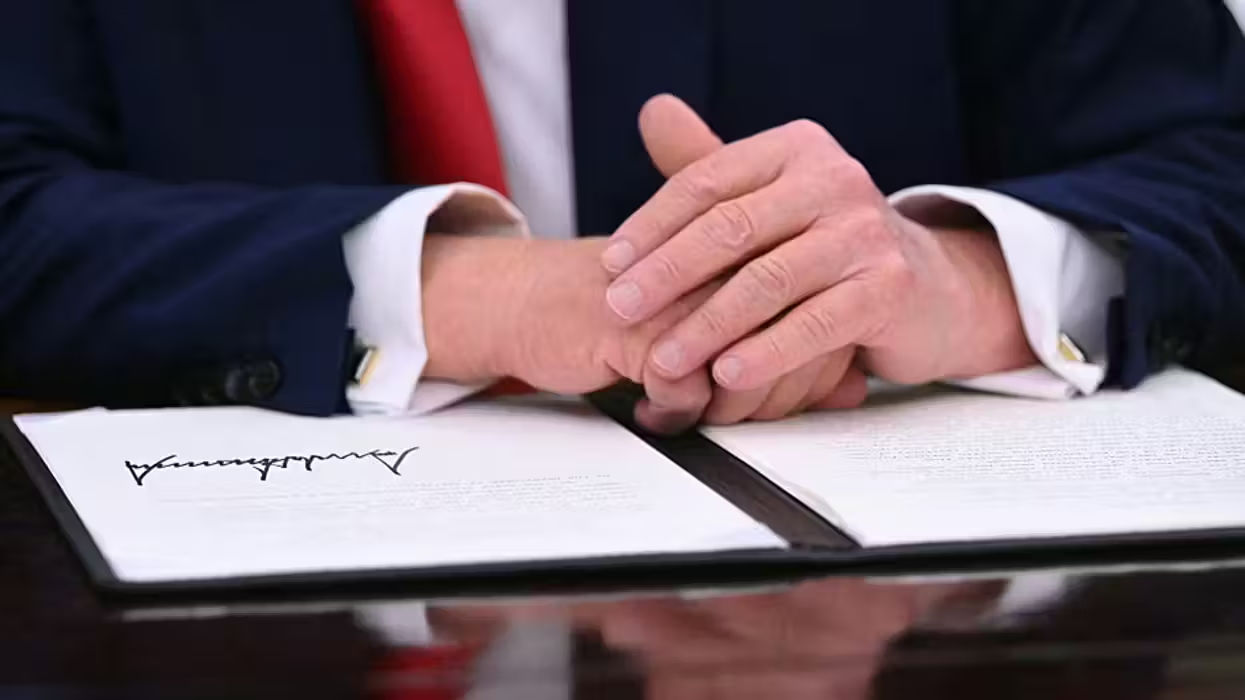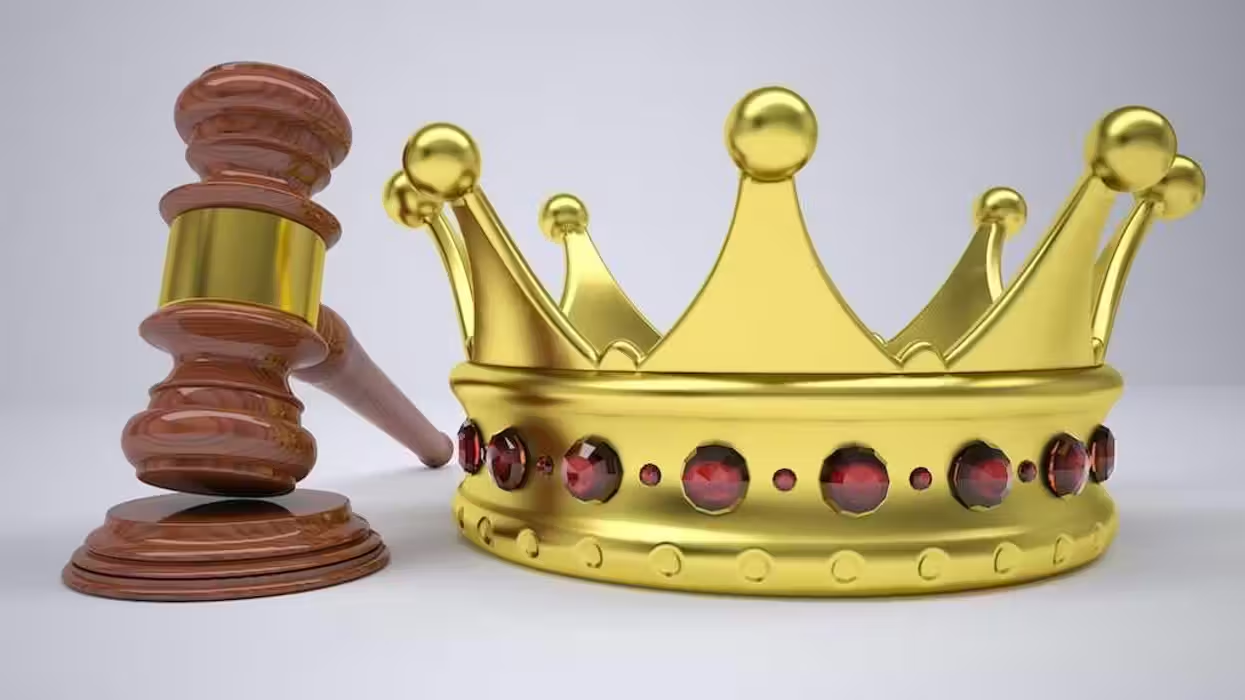
© 2025 Blaze Media LLC. All rights reserved.
UPDATE:
Glenn Beck's TV team has provided The Blaze with an updated background and research guide for its George Soros expose. According to the team, it contains added sources and links. The original guide is still available in this story:
Updated Soros Research With Added Sources
Editor's note: The following outline was obtained by The Blaze from Glenn Beck's TV team. It is the background document they used to produce Tuesday night's George Soros expose. It has been edited for form but not content.
BACKGROUND
“Messianic Fantasies”
- “It is sort of a disease when you consider yourself some kind of god, the creator of everything, but I feel comfortable about it now since I began to live it out,” (The Independent, June 3, 1993)
- “I admit that I have always harbored an exaggerated view of self-importance –to put it bluntly, I fancied myself as some kind of god or an economic reformer like Keynes or, even better, a scientist like Einstein,” (The Alchemy of Finance, George Soros)
- According to friend Byron Wien (now with the Blackstone Group), “You must understand he thinks he’s been anointed by God to solve insoluble problems. The proof is that he has been so successful at making so much. He therefore thinks he has a responsibility to give money away,” (Time Magazine, Sept 1, 1997)
- “If truth be known, I carried some rather potent messianic fantasies with me from childhood which I felt I had to control, otherwise I might end up in the loony bin. But when I made my way in the world I wanted to indulge myself in my fantasies to the extent that I could afford.”
- George Soros 60 Minutes Interview - 12/20/98 / Transcript:
KROFT: Are you religious?
Mr. SOROS: No.
KROFT: Do you believe in God?
Mr. SOROS: No.
KROFT: (Voiceover) Soros told us he believes God was created by man, not the other way around, which may be why he thinks he can smooth out the world's imperfections.
“THE MAN WHO BROKE THE BANK OF ENGLAND”
- “As September 15 wore on, George Soros’s confidence that Britain would pull the pound out of the ERM was growing. It had been Stanley Druckenmiller who had thought the time ripe for making a bet against the sterling. He talked to Soros about doing something. Soros gave him the green light but urged his head trader to bet an even larger sum than Druckenmiller had in mind. And so Druckenmiller, acting for Soros, sold $10 billion worth of sterling… The next morning at 7:00, the phone rang at Soros’s home. It was Stan Druckenmiller with news… While George Soros had slept, he racked a profit $958 million. When Soros’s gains from other positions he took during the ERM crisis were tallied, he racked up close to $2 billion… It was this bet, this single act of placing $10 billion on the fact that Britain would have to devalue the pound, that made George Soros world famous,” (SOROS THE UNAUTHORIZED BIOGRAPHY, pgs 5-6).
- “He famously shorted the British pound in 1992, wagering $10 billion on a drop in its value. In a desperate bid to keep its currency afloat, the Bank of England tried to buy up pounds as fast as Soros could dump them. However, as more and more investors followed Soros’ lead and joined his efforts, the Bank of England eventually gave up. The British pound was devalued, launching a tsunami of financial turmoil from Tokyo to Rome. When it was over, millions of hardworking Britons confronted their diminished savings, while Soros counted his gains. He had personally made nearly $2 billion on the catastrophe,” (The Shadow Party, pg. 4).
- Soros has said of this event: “I had no platform, so I deliberately [did] the sterling thing to create a platform. Obviously people care about the man who made a lot of money…my influence has continued to grow and I do have access to,”(Time Magazine, Sept 1, 1997)
- In 1997, during the Asian financial crisis, the then Malaysian Prime Minister, Mahathir bin Mohamad, accused him of bringing down the Malaysian currency, the ringgit, through his trading activities. In Thailand he was branded an “economic war criminal” who “sucks the blood from the people”.
REVOLUTIONS
- “Just write that the former Soviet Empire is now called the Soros Empire,” (The New Republic, Jan 1994)
- “I am acting out a fantasy and so is Eastern Europe. A psychiatrist once told me how dangerous it is to act out fantasies and I am beginning to see what he meant,” (https://www.osi.hu/oss/postscript.html)
ANTI-SEMITISM
- In a 1998 nterview with Steve Kroft, Soros was asked if he felt guilty about confiscating property from Jews as a teenager. He responded, “No.”
- "I don't deny the Jews their right to a national existence--but I don't want to be part of it."That experience notwithstanding, Soros has chosen to exclude Israel and Jewish causes, by and large, from his massive philanthropy-a decision that has caused comment among one of his colleagues in the financial community, particularly those who are strong supporters of Israel. In Hungary, Soros has been subject to anti-Semitic attacks. Referring to being a target, Soros, in his book "Underwriting Democracy," wrote, "I am ready to stand up and be counted." When I mentioned that rather suggestive line to Soros during one of several extended interviews with him, he responded quickly, "Right. It took me a long time."
He continued, "My mother was quite anti-Semitic, and ashamed of being Jewish. Given the culture in which one lived, being Jewish was a clear-cut stigma, disadvantage, a handicap-and, therefore, there was always the desire to transcend it, to escape it." He confirmed what someone had told me-that his family name had long ago been changed from Schwartz. "So the assimilationist Jews of Hungary had a deep sense of inferiority and it took me a long time to work through that," he said, adding, however, that he succeeded in doing so many years ago… "I am escaping the particular. I think I am doing exactly that by espousing this universal concept"-of open society. "In other words, I don't think that you can ever overcome anti-Semitism if you behave as a tribe… the only way you can overcome it is if you give up the tribalness."
(Source: THE WORLD ACCORDING TO SOROS by CONNIE BRUC, The New Yorker, January 23, 1995,)
- “As I looked around me for a worthy cause. I ran into difficulties. I did not belong to any community. As a Hungarian Jew I had never quite become an American. I had left Hungary behind and my Jewishness did not express itself in a sense of tribal loyalty that would have led me to support Israel,” (https://www.osi.hu/oss/ch1.html)
INFO ON NAME CHANGE FROM SHWARTZ TO SOROS
- Born in Hungary in 1930, Mr. Soros began life as George Schwartz. His father, Tivadar, was from humble origins; his mother, Erzebet, from money. Both were Jews, but nonobservant (she eventually converted to Catholicism). Once married, Tivadar had to work just two hours a day managing some of his wife's family property, which provided a handsome living for them and their two sons, Paul and George. At some point during the boys' childhood, the parents decided to change the family name and chose the Hungarian-sounding but in fact obscure Soros. It means "soar" (in the future tense) in Esperanto, the made-up trans-European language promoted by those who dreamed of a world free of nationality. Tivadar was among its leading proponents. (Source: The Mind of George Soros; Meet the Esperanto enthusiast who wants to save the world from President Bush, 2 March 2004, The Wall Street Journal)
- Before the end of the war, however, Soros' upper-middle-class world had inverted. The family posed as Christians and separated to hide from the Germans. They changed their name from Schwartz (considered too Jewish-sounding) to Soros (more reflective of the family's Hungarian roots and because his father liked the palindrome). (The elusive billionaire: An author tries valiantly to capture the essence of philanthropist George Soros, Vancouver Sun, 20 April 2002)
MORE ON TIVADAR SOROS
The other day, George Soros and his older brother Paul, an engineer turned investor-philanthropist, met in the offices of Soros Fund Management to discuss their father. The occasion was the English-language publication of Tivadar Soros's wartime memoir, "Masquerade: Dancing Around Death in Nazi-Occupied Hungary," which was first published in 1965 in Esperanto, one of six languages in which Soros pere was fluent.
"It was his nature, regardless of difficulties, to believe that one must behave like a human being and one must make the most of life," Paul Soros said, explaining the charm and ebullience of his father, who, in the book, is described by his five-year-old son George as "a married bachelor," and who, even when living semi-reclusively under an assumed Christian identity, never missed his daily swim. "I remember during the siege we went to the opera, because at a time when there was no food the opera still served very nice hors d'oeuvres and patisserie. Whether or not it was prudent, the idea was that you should make the most of your circumstances."
George, who, like Paul, has inherited his father's broad face, pointed out that Tivadar's fondness for the comforts of bourgeois life was not accompanied by a docile bourgeois sensibility. "We didn't preserve ordinariness," George said. "He made us very conscious that these were extraordinary times and that the normal rules didn't apply." In the book, Tivadar writes that at one point young George was required by the authorities to deliver notices to certain Jews that they should report to the Rabbinical Seminary with blankets and food. "This was a profoundly important experience for me," George said. "My father said, 'You should go ahead and deliver them, but tell the people that if they report they will be deported.' The reply from one man was 'I am a law-abiding citizen. They can't do anything to me.' I told my father, and that was an occasion for a lecture that there are times when you have laws that are immoral, and if you obey them you perish."
"Masquerade" contains a great deal of black social comedy; a running theme is Tivadar's efforts to convince his recalcitrant mother-in-law that, all things considered, it really would be best if she stopped regarding the occupation as a personal insult. ("I refuse to go anywhere if the people don't know who I am and I have to pretend I'm somebody else all the time," she said of his attempts to find a safe house for her.) Tivadar's own ease with his assumed identity-he grew a mustache, and went by Elek Szabo-led him, one day during an air raid, to tell a neighbor in the shelter about the time he approached the podium on which Hitler was standing at the 1936 Winter Olympics, just to see how close he could get. "Hardly fifteen minutes had passed after my tale when there was suddenly a great commotion," Tivadar wrote. "The shelter commander appeared, surrounded by several officers. . . . It transpired that the air-defense commander, in great excitement that there was someone present who had seen Hitler, had radioed headquarters and a group had come over right away to see this privileged person."
Tivadar's energies, though, were largely devoted to the extremely serious business of procuring papers to save relatives and friends from a new, unimaginable form of terror. "My father was ahead of the curve, because he recognized the moment the Germans came in that this was a different world and one had to act differently," George said. He and Paul agreed that they still try to live by their father's resourceful example. "The funny thing is that in character we probably both inherited a lot more from our mother," George said.
GLOBALIZATION
- Soros has long been calling for increased globalization. In "The Crisis of Global Capitalism," 1998 he writes: “To stabilize and regulate a truly global economy, we need some global system of political decision-making. In short, we need a global society to support our global economy. A global society does not mean a global state. To abolish the existence of states is neither feasible nor desirable; but insofar as there are collective interests that transcend state boundaries, the sovereignty of states must be subordinated to international law and international institutions. Interestingly, the greatest opposition to this idea is coming from the United States. But there has never been a time when a strong lead from the U.S. and other like-minded countries could achieve such powerful and benign results. With the right sense of leadership and with clarity of purpose, the U.S. and its allies could help to stabilize the global economic system and to extend and uphold universal human values. The opportunity is waiting to be grasped.”
(Source: The Crisis of Global Capitalism.(book excerpt), George Soros, 7 December 1998, Newsweek)
- During this year he called for greater authority to institutions such as the World Bank and the International Monetary Fund (IMF) and for an International Credit Insurance Corp. to establish some kind of supervision over national supervisory authorities and stated, “At the same time, there remains the urgent need for Congress to authorise an increase in the capital of the IMF." He admitted that such "radical ideas" could not even be considered until Congress "changes its attitude toward international institutions in general and the IMF in particular." (Source: Soros calls for global credit insurance agency, 15 September 1998, Reuters News)
- Soros has said that the United States would cease to be the world's undisputed dominant force. "The veto power that we have in the International Monetary Fund will disappear. We will be downsized. At the same time, hopefully, we will have a better working system and opponents will be more downsized than we will."
(Source: BOSTON, Oct. 29 -- Massachusetts Institute ofTechnology press release via Factiva)
- “The Bubble of American Supremacy,”: “The disparity between private goods and public goods manifests itself in a number of ways. First, there is a growing inequality between rich and poor, both within countries and among countries. Admittedly, globalisation is not a zero-sum game: its benefits exceed the costs in the sense that the increased wealth produced by globalisation could be used to make up for the inequities and other shortcomings of globalisation and there would still be some extra wealth left over.
The trouble is that the winners do not compensate the losers either within states or between states. The welfare state as we know it has become unsustainable and international income redistribution is practically nonexistent. Total international assistance amounted to $US56.5 billion ($74.4 billion) in 2002. This amount represents only 0.18 per cent of global GDP. As a result, the gap between the rich and the poor continues to grow.”
(Source: Edited extract from The Bubble of American Supremacy by George Soros via The Sydney Morning Herald, February 4, 2004)
KARL POPPER
SOROS’ PHILOSOPHY
- At the London School of Economics, Soros discovered the work of philosopher Karl Popper, whose ideas on open society had a profound influence on his thinking. He was attracted to Popper's critique of totalitarianism, The Open Society and Its Enemies, which maintained that societies can only flourish when they allow democratic governance, freedom of expression, a diverse range of opinion, and respect for individual rights. Later, working as a trader and analyst, he adapted Popper to develop his own "theory of reflexivity," a set of ideas that seeks to explain the relationship between thought and reality, which he used to predict, among other things, the emergence of financial bubbles. Soros began to apply his theory to investing and concluded that he had more talent for trading than for philosophy. In 1967 he helped establish an offshore investment fund; and in 1973 he set up a private investment firm that eventually evolved into the Quantum Fund, one of the first hedge funds. https://www.soros.org/about/bios/staff/george-soros
QUOTES FROM “The Open Society and Its Enemies: Hegel and Marx,” by Karl Popper (Vol. 2), by Karl Popper
- The development of capitalism has led to the elimination of all classes but two, a small bourgeiouse and a huge proletariat: and the increase of misery has forced the latter to revolt against its exploiters. The conclusions are, first, that the workers must win the struggle, secondly that, by eliminating bourgeiouse, they must establish a classless society, since only one class remains. (pg 151-152)
- But all over the earth, organized political power has begun to perform far-reaching economic functions. Unrestrained capitalism has given way to a new historical period, to our own period of political interventionism, of the economic interference of the state. Interventionism has assumed various forms. There is the Russian variety; there is the fascist form of totalitarianism; and their s the domestic interventionism of England, of the United States, and the “Smaller Democracies” led by Sweden where the technology of democratic intervention has reached the highest level so far. (pg 155)
- Admittedly, increasing misery must produce resistance, and it is even likely to produce rebellious outbreaks. But the assumption of our argument is that the misery cannot be alleviated until victory has been won in the social revolution. (pg 163)
- I am not in all cases and under all circumstance against a violent revolution. (pg 166)
- …the working of democracy rests largely upon the understanding that a government which attempts to misuse its powers and to establish itself as a tyranny (or which tolerates the establishment of a tyranny by anybody else) outlaws itself, and that the citizens have not only a right, but also a duty to consider the action of such government a crime, and its members as a dangerous gang of criminals. (pg 167)
MORE ABOUT KARL POPPER
https://www.hoover.org/publications/hoover-digest/article/8018
- Although compelled to leave his native Austria in the 1930s (because of his Jewish ancestry), his book is remarkably free from personal bitterness or sadness.
- He did not shrink from tracing the sources of those dangerous ideas to Marx, to Hegel, and even to that greatest of all philosophers, Plato. At a time when many intellectuals had lost faith in democracy, Popper offered a spirited defense of democratic principles and outlined a compelling vision of a society grounded in democratic reforms.
- Popper was a fallibilist, one who perceives great error and danger in any theory of knowledge—or regime—that claimed to offer certain truth. In such a system, there would be no incentive to establish social and political structures that promote learning or the free exchange of ideas; truth is already at hand. In the name of historical progress, the regime may then justify the squelching of human freedoms and even atrocities on a grand scale.
- George Soros, who first encountered The Open Society as Popper’s student at the London School of Economics, founded the Open Society Institute to propagate Popper’s ideas, particularly in Eastern Europe. Thus the political philosophy Popper first articulated before the start of the Cold War is now being studied and put into practice in countries newly emerging from behind the Iron Curtain.
- He left school at age sixteen and began auditing lectures at the University of Vienna. Although a Marxist as a teenager, he was repelled in 1919 by the leftist-inspired street violence of postwar Vienna that resulted in the deaths of demonstrators. That same year, he studied Freud’s psychoanalysis and worked for a time with psychiatrist Alfred Adler.
- In 1922 he matriculated at the University of Vienna. To support himself, he apprenticed himself to a cabinetmaker and took up social work. Pursuing his goal of becoming a schoolteacher, Popper subsequently returned to the university. In 1928, he earned a Ph.D. in philosophy and, in 1929, a teacher’s certificate. Beginning in the late 1920s, Popper began interacting with members of the famous Vienna Circle of logical positivists, a group of prominent intellectuals trying to articulate the importance of science for philosophy. Shortly after publishing (in German) a then little-noticed but classic work on the logical foundations of science in 1934, Popper left Austria under the threat of Nazi anti-Semitism. From New Zealand, where he had obtained a university teaching post, he returned to England after World War II as professor of philosophy of science at the London School of Economics, where he remained until his retirement.
SOROS’ CURRENT TIES
SOROS AND PRESIDENT OBAMA
- In December 2006, Soros met with presidential hopeful Barack Obama in Soros’ New York office. Soros had previously hosted a fundraiser for Obama during his 2004 campaign for the Senate.
- On January 16, 2007, Obama announce the creation of a presidential exploratory committee and within hours Soros sent a contribution of $2,100, the maximum allowable under campaign finance laws.
- Days after Obama was elected in November of 2008, Soros said in an interview “I think we need a large stimulus package which will provide funds for state and local government to maintain their budgets – because they are not allowed by the constitution to run a deficit. For such a program to be successful, the federal government would need to provide hundreds of billions of dollars. In addition, another infrastructure program is necessary. In total, the cost would be in the 300 to 600 billion dollar range.” Since then, Congress passed a $787 billion stimulus and Obama very recently introduced a $50 billion plan to improve the country’s transportation program, saying “I want America to have the best infrastructure in the world.”
- In that same interview, Soros called for cap & trade: “I think this is a great opportunity to finally deal with global warming and energy dependence. The US needs a cap and trade system with auctioning of licenses for emissions rights. I would use the revenues from these auctions to launch a new, environmentally friendly energy policy. That would be yet another federal program that could help us to overcome the current stagnation.” Since then, Congress has introduced cap & trade legislation. (More info in “going green” section)
- Also in that interview, Soros said “In 2010, the Bush tax cuts will expire and we should not extend them.” Since then, Obama expressed his opposition to the Bush tax cuts in an interview with ABC on September 9th: “All those middle class folks who need tax relief hostage right now in order to provide tax breaks for the top two percent wealthiest Americans, who don't need a tax break, aren't asking for a tax break. And you know, if we could afford it, it'd be one thing. But we know that's gonna cost $700 billion over ten years. And so, that is not a smart thing to do for the economy”
- Soros is also on board with Obama’s proposals to reform the banking system. In an interview with the BBC: Interviewer: Now President Obama last week announced some quite radical proposals to reform the banking system. He wants them out of what he calls "proprietary trading", using their capital to speculate on their own account, and also he wants a limit on their size. Are these constructive measures in your view? Soros: Very much so these are the right … it goes in the right direction. In my opinion, it doesn't actually go far enough because it still leaves the problem of too big to fail. In other words, if you let's say now again Goldman Sachs gives up its banking license, it becomes then an investment bank …
January 2010, https://news.bbc.co.uk/2/hi/business/davos/8485029.stm
- Since Obama’s been in office, Soros has made four visits to the White House
- ALSO IN HIS 2008 INTERVIEW:
Soros: “I think this is a great opportunity to finally deal with global warming and energy dependence. The US needs a cap and trade system with auctioning of licenses for emissions rights. I would use the revenues from these auctions to launch a new, environmentally friendly energy policy. That would be yet another federal program that could help us to overcome the current stagnation.
SPIEGEL: Your proposal would be dismissed on Wall Street as "big government." Republicans might call it European-style "socialism."
Soros: That is exactly what we need now. I am against market fundamentalism. I think this propaganda that government involvement is always bad has been very successful -- but also very harmful to our society.
SPIEGEL: Would you advise the new president to say that publicly?
Soros: He has already spoken about changing the political discourse. I think it is better to have a government that wants to provide good government than a government that doesn't believe in government.
WILL ANOTHER FISCAL STIMULUS BE NEXT?
- “The simple truth is that the private sector does not employ available resources. Mr. Obama has in fact been very friendly to business, and corporations are operating profitably. But instead of investing, they are building up liquidity. Perhaps a Republican victory would boost their confidence, but in the meantime, investment and employment require fiscal stimulus,” (Financial Times, Oct. 4, 2010)
LAUNCHING A WAR AGAINST PRESIDENT BUSH
- Soros told the Washington Post: “I have made rejection of the Bush doctrine the central project of my life… America, under Bush, is a danger to the world. And I'm willing to put my money where my mouth is."
- Also during that election: “This is the most important election of my lifetime. These aren’t normal times. The ends justify every legal means possible.”
Read more https://www.newyorker.com/archive/2004/10/18/041018fa_fact3?currentPage=3#ixzz0xAm1jvyV
SOROS AND VAN JONES
- Soros has also supported Van Jones – Originally through the Open Society Institute which gave the Ella Baker Center $151,800 in 2006 and $140,000 in 2007. Van Jones was head of the Ella Baker Center during those years. OSI also funded Green for All in 2008 -- they received a grant in the amount of $75,000 to “integrate the Civic Justice Corps into Green For All's campaign to create a national Clean Energy Corps.” while Van Jones was running it. Van Jones later appeared as a senior fellow at the Center for American Progress. Additionally, OSI helped fund TIDES which then started the Apollo Alliance (where Van Jones sat on the board).
CAP & TRADE
- Soros is also a huge proponent of cap and trade. The sot below sounds very similar to VAN JONES’ “We’renot going to put a new battery in a broken system.”
SOROS: “work on a better world order where we work together to resolve problems that confront humanity like global warming. And I think that dealing with global warming will require a lot of investment.
SOROS: You see, for the last 25 years the world economy, the motor of the world economy that has been driving it was consumption by the American consumer who has been spending more than he has been saving, all right? Than he’s been producing. So that motor is now switched off. It’s finished. It’s run out of — can’t continue. You need a new motor. And we have a big problem. Global warming. It requires big investment. And that could be the motor of the world economy in the years to come…Instead of consuming, building an electricity grid, saving on energy, rewiring the houses, adjusting your lifestyle where energy has got to cost more until it you introduce those new things. So it will be painful. But at least we will survive and not cook.
MOYERS: You’re talking about this being the end of an era and needing to create a whole new paradigm for the economic model of the country, of the world, right?
GEORGE SOROS: Yes.
VIDEO: https://green.blogs.nytimes.com/2008/10/14/george-soros-on-the-green-energy-economy/
MORE ON GREEN INITIATIVES
- In 2009, Soros announced the formation of the Climate Policy Initiative to address global warming, and said he would fund it with $10 million a year over 10 years
- Friends of the Earth is another group that receives Soros money. In 2008 they received $50,000 from OSI to “build and support an international network of organizations dedicated to improving the environmental, social and developmental impacts of Chinese overseas investments.” Friends of the Earth also received $180,000 from Tides Foundation in 2008 to “integrate a climate equity perspective in the presidential transition.”
THE OPEN SOCIETY INSTITUTE
- Soros started Open Society in 1993
- Soros has given away over $7 billion to “support human rights, freedom of expression, and access to public health and education in 70 countries.”
- Up to $425 million donated annually
- Aryeh Neier is the president of the Open Society Institute and Soros foundations network. “Neier personally created the radical group Students for a Democratic Society in 1959… He worked for the American Civil Liberties Union for fifteen years,” (The Shadow Party, pg 23).
- Open Society Foundations recently pledged its largest donation ever to Human Rights Watch in the amount of $100 million to be distributed over 10 years
- Richard Poe writes, “Through his global web of Open Society Institutes and Open Society Foundations, Soros has spent 25 years recruiting, training, indoctrinating and installing a network of loyal operatives in 50 countries, placing them in positions of influence and power in media, government, finance and academia.”
- Some organizations that have received support from OSI:
- Center for American Progress
- Tides Foundation
- Campaign for America’s Future
- National Council of La Raza
- ACORN
- Apollo Alliance
- Center for Community Change
- Free Press
- MoveOn.org
- Top 20 grant recipients in 2008 (the most recent OSI filing)
- International Crisis Group $5,000,000
- Ministry of Education Republic of Liberia $4,250,000
- Drug Policy Alliance $4,000,000
- Media Development Loan Fund $3,900,000
- Bard College $3,094,539
- Proteus Fund Inc $3,000,000
- The Revenue Watch Institute $3,000,000
- The Tides Foundation $2,875,000
- The Mayors Fund to Advance New York City $2,512,415
- Center on Budget and Policy Priorities $2,107,000
- Public Interest Projects $1,700,000
- The Tides Center $1,396,681
- Center for Community Change $1,362,500
- Leadership Conference on Civil Rights education$1,320,000
- Fund for the European University $1,100,000
- Center for New York City Neighborhoods $1,050,000
- American Civil Liberties Union Foundation $1,000,000
- Center for American Progress $1,000,000
- Foundation to Promote Open Society $1,000,000
- Link Media Inc $1,000,000
(Source: Open Society Institute, IRS Form 990-PF, 2008)
CENTER FOR AMERICAN PROGRESS
- Early in 2003, Soros pledged $3 Million over 3 years to the think tank
- He awarded $1 Million in grants to Center for American Progress for 2008/2009
- The group was largely set up to prevent Bush from gaining re-election in 2004. Soros told the Washington Post: “I have made rejection of the Bush doctrine the central project of my life… America, under Bush, is a danger to the world. And I'm willing to put my money where my mouth is."
- The organization is headed by John Podesta
- Van Jones is currently a senior fellow
- In its first year, CAP took in more than $10 million
- In 2006, CAP launched a network of liberal religious leaders called Faith in Public Life to “fuel this burgeoning faith movement with cutting edge strategies and capacity-building resources”
- CAP’s campus Progress, with a staff of 15 and a large network of student advisers, offers money and guidance to help college activists launch initiatives and newspapers
- CAP has a congressional outreach staff and aides dedicated to booking its experts on talk shows. It has a studio that offers daily taped segments and talking points for radio hosts, and it broadcasts liberal radio host Ed Schultz's show when he's in town.
TIDES
- 2008 funding from Open Society Institute to Tides (latest year for which the OSI has filed a Form 990 document with the IRS):
The Tides Center: $1.354 million
Tides Foundation: $2.875 million
Total: $4.229 million
- Drummond Pike is Founder & CEO of Tides Foundation. He is also Treasurer of Democracy Alliance, a group that was founded with major financial backing from member George Soros.
- The Apollo Alliance is a project of the Tides Center.
- Van Jones is a former board member
- Apollo Alliance helped to design and promote the stimulus bill which included $110 billion for “green spending”
SOJOURNERS
- Open Society gave Sojourners a $200,000 grant in 2004, $25,000 in 2006, and $100,000 in 2007.
THE QUANTAM FUND
- Soros launched the Quantam Fund after immigration to America from London in 1956. It was one of the world’s first private hedge funds.
- Soros recently passed much of the fund’s management to his two grown sons, Robert and Jonathan
- The fund, which is registered in the Netherlands Antilles, turned an original investment of six million dollars, in 1969, into five and a half billion dollars by 1999.
AMERICAN CONSTITUTION SOCIETY
The American Constitution Society is a left-wing legal activist group working to change our nation’s laws and approaches towards law enforcement. One of its areas of focus is constitutional interpretation and change.
OPEN SOCIETY INSTITUTE DISCLOSED GRANTS TO ACS
Grants disclosed on George Soros’ Open Society Institute's Form 990 tax filings to American Constitution Society for Law and Policy (ACS) going back to 2002 (with the exception of the 2005 filing which could not be searched electronically). Open Society's 2002 filing referenced that the grant was designated for start-up of ACS. Adding all the totals from each year below (excluding 2005) comes to $14,602,850.
2008 funding: $3.65 million
2007 funding: $4.5 million
2006 funding: $5,025,000
2004 funding: $676,800
2003 funding: $251,050
2002 funding: $500,000
Want to leave a tip?
We answer to you. Help keep our content free of advertisers and big tech censorship by leaving a tip today.
Want to join the conversation?
Already a subscriber?
Jonathon M. Seidl is a former managing editor of Blaze News and a best-selling author and speaker. His next book, “Confessions of a Christian Alcoholic,” will be released on October 7, 2025.
Jonathon M. Seidl
Jonathon M. Seidl is a former managing editor of Blaze News and a best-selling author and speaker. His next book, “Confessions of a Christian Alcoholic,” will be released on October 7, 2025.
more stories
Sign up for the Blaze newsletter
By signing up, you agree to our Privacy Policy and Terms of Use, and agree to receive content that may sometimes include advertisements. You may opt out at any time.
Related Content
© 2025 Blaze Media LLC. All rights reserved.
Get the stories that matter most delivered directly to your inbox.
By signing up, you agree to our Privacy Policy and Terms of Use, and agree to receive content that may sometimes include advertisements. You may opt out at any time.






